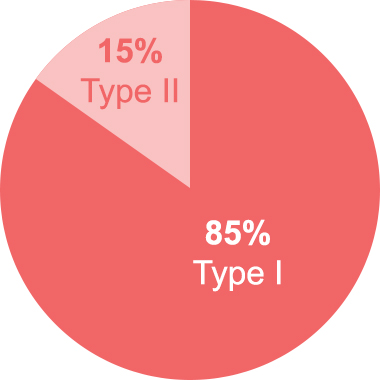Hereditary Angioedema
An autosomal dominant disease caused by either a lack of C1-inhibitor protein or dysfunctional C1-inhibitor protein
Disease Overview
Hereditary Angioedema, or HAE, is a very rare and potentially life-threatening genetic condition that involves recurrent attacks of severe swelling (angioedema) in various parts of the body, including the hands, feet, genitals, stomach, face and/or throat. Swelling in the airway can restrict breathing and be fatal. Episodes may be triggered by physical trauma or emotional stress, however, swelling often occurs without a known trigger.
Symptoms of HAE usually appear early in life, most often by age 13, and may increase in severity after puberty. Because HAE is so rare, it can take as long as a decade to obtain an accurate diagnosis after symptoms are first experienced.
When untreated, an HAE attack often lasts for three days, sometimes even longer, and many people with HAE experience three or more swelling attacks per month. The frequency and severity of attacks vary significantly among individuals, even among affected family members.
The vast majority of people with HAE have a genetic defect that causes a deficiency in the plasma protein called C1-Inhibitor. HAE is also seen in people who have normal levels of C1-Inhibitor, however, genetic defects in other genes cause their angioedema.
HAE Type I
Representing approximately 80 to 85% of HAE cases, people with HAE Type I have levels of the C1-Inhibitor protein that are considerably below normal due to a defective gene on chromosome 11.
There is usually a family history of Hereditary Angioedema, but a number of cases are due to a spontaneous mutation of the gene.
HAE Type II
HAE Type II makes up approximately 15 to 20% of HAE cases. People with Type II have adequate or even elevated levels of the C1-Inhibitor protein; however, it does not function properly. Symptoms and treatment are the same as with HAE Type I.
HAE with Normal C1-Inhibitor
People affected by HAE with Normal C1-Inhibitor levels and function can experience swelling generally similar to Types I and II.
Symptoms: HAE Attacks
People with HAE experience recurrent episodes of swelling in the hands, feet, genitals, stomach, face, and/or throat that can last from two to five days. The frequency and severity of attacks may vary dramatically in people affected by HAE, even those in the same family. About 25% of people with HAE experience a flat, non-itching red rash that often occurs before or during an HAE attack.

It is important to remember that swelling from Hereditary Angioedema is NOT the same as swelling due to allergies and CANNOT be treated as an allergic reaction. Neither epinephrine, antihistamines, nor corticosteroids are effective in treating HAE symptoms.
Causes
The vast majority of people with HAE have a defect in the gene that controls a blood protein called C1-Inhibitor. This defect causes a biochemical imbalance that produces swelling.
HAE is hereditary and children have a 50% chance of inheriting HAE if one of their parents has the condition. However, the absence of a family history does not rule out the diagnosis of HAE. Children of people with HAE may also inherit the condition.
Diagnosis
MOST cases of angioedema or swelling are NOT HAE or C1-Inhibitor deficiency.
HAE is very rare, and most people – including medical professionals – are unfamiliar with the disease until they encounter someone who has it. Even then, as symptoms come and go, it is common for people with HAE to remain undiagnosed for many years.
Proper diagnosis is crucial for successful treatment and management of HAE. Laboratory analysis of blood samples, or genetic samples, are required to establish an HAE diagnosis. There are three specific blood tests used to confirm Hereditary Angioedema Type I or II:
1. C1-Inhibitor quantitative (antigenic)
2. C1-Inhibitor functional
3. C4
Triggers
While some attacks appear to be spontaneous, some of the more common causes of HAE attacks are:
- Anxiety
- Stress
- Minor trauma
- Surgery
- Ailments such as colds/flu/other viral infections
People with HAE have also reported swelling in extremities following:
- Typing
- Prolonged writing
- Hammering
- Shoveling
- Other physical activities

Reference:
1. https://www.haea.org/pages/p/what_is_hae

